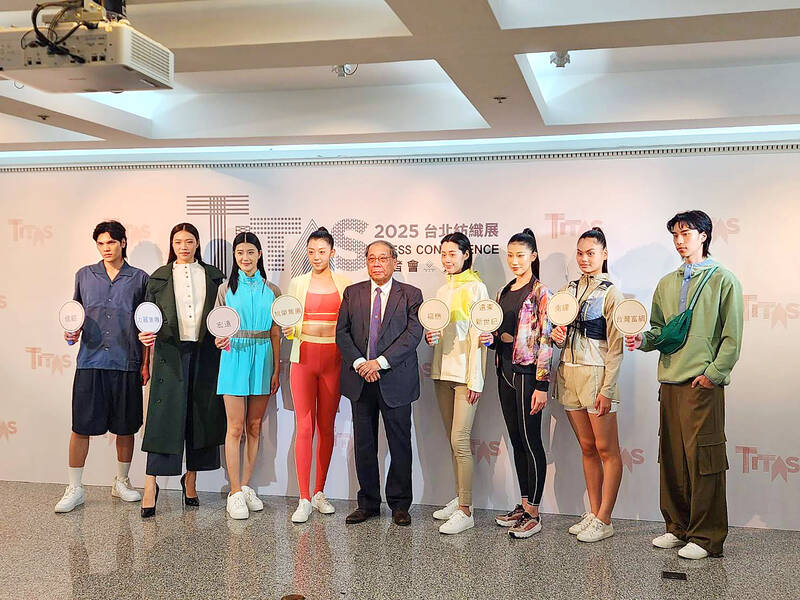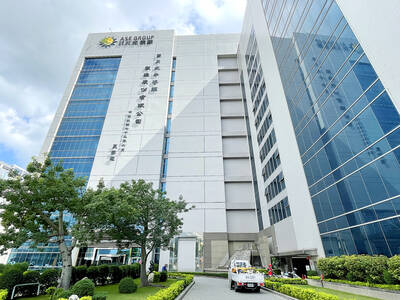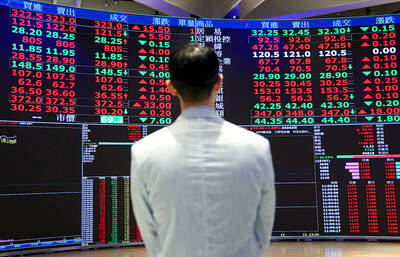This year’s Taipei Innovative Textile Application Show (TITAS) is to highlight sustainability, functional applications and intelligent manufacturing as the industry faces potential US tariff threats, the event’s organizer, the Taiwan Textile Federation, said yesterday.
Federation president Justin Huang (黃偉基) said that since the US is the world’s largest textile consumer, higher tariffs could lead to inflation and negatively affect US market growth.
In light of possible market and supply chain restructuring, the exhibition would showcase the industry’s latest achievements, including fabrics that are fully recyclable or made from biodegradable materials, as well as innovations in smart manufacturing technologies, the federation said in a statement.

Photo: CNA
TITAS is a platform for vertical communication and knowledge exchange between different sectors within the textile industry, it said.
The event would also feature a fashion show titled: “Taiwan Textile Select: Recode 2025” on Wednesday next week, in which designers are to present Taiwan’s sustainable textiles in international fashion styles, the federation said.
Huang said that through multiple approaches — such as inviting international buyers to Taiwan for procurement meetings, identifying promising textile traders and organizing fashion shows to highlight achievements — this year’s TITAS aims to promote Taiwan as a global “sustainable textile sourcing center.”
A total of 388 exhibitors from 10 countries, including the US, Sweden and Switzerland, are to set up 904 booths at the 29th edition of TITAS, which would take place at the Taipei Nangang Exhibition Center’s Hall 1 from Tuesday next week to Thursday, the federation said.

EXPANSION: The investment came as ASE in July told investors it would accelerate capacity growth to mitigate supply issues, and would boost spending by 16 percent ASE Technology Holding Co (ASE, 日月光投控), the world’s biggest chip assembly and testing service provider, yesterday said it is investing NT$17.6 billion (US$578.6 million) to build a new advanced chip packaging facility in Kaohsiung to cope with fast-growing demand from artificial intelligence (AI), high-performance-computing (HPC) and automotive applications. The new fab, called K18B, is to commence operation in the first quarter of 2028, offering chip-on-wafer-on-substrate (CoWoS) chip packaging and final testing services, ASE said in a statement. The fab is to create 2,000 new jobs upon its completion, ASE said. A wide spectrum of system-level chip packaging technologies would be available at

Taiwan’s foreign exchange reserves hit a record high at the end of last month, surpassing the US$600 billion mark for the first time, the central bank said yesterday. Last month, the country’s foreign exchange reserves rose US$5.51 billion from a month earlier to reach US$602.94 billion due to an increase in returns from the central bank’s portfolio management, the movement of other foreign currencies in the portfolio against the US dollar and the bank’s efforts to smooth the volatility of the New Taiwan dollar. Department of Foreign Exchange Director-General Eugene Tsai (蔡炯民)said a rate cut cycle launched by the US Federal Reserve

HEAVYWEIGHT: The TAIEX ended up 382.67 points, with about 280 of those points contributed by TSMC shares alone, which rose 2.56 percent to close at NT$1,400 Shares in Taiwan broke records at the end of yesterday’s session after contract chipmaker Taiwan Semiconductor Manufacturing Co (TSMC, 台積電) hit a fresh closing-high amid enthusiasm toward artificial intelligence (AI) development, dealers said. The TAIEX ended up 382.67 points, or 1.45 percent, at the day’s high of 26,761.06. Turnover totaled NT$463.09 billion (US$15.22 billion). “The local main board has repeatedly hit new closing highs in the past few sessions as investors continued to embrace high hopes about AI applications, taking cues from a strong showing in shares of US-based AI chip designer Nvidia Corp,” Hua Nan Securities Co (華南永昌證券) analyst Kevin Su

Nvidia Corp’s major server production partner Hon Hai Precision Industry Co (鴻海精密) reported 10.99 percent year-on-year growth in quarterly sales, signaling healthy demand for artificial intelligence (AI) infrastructure. Revenue totaled NT$2.06 trillion (US$67.72 billion) in the last quarter, in line with analysts’ projections, a company statement said. On a quarterly basis, revenue was up 14.47 percent. Hon Hai’s businesses cover four primary product segments: cloud and networking, smart consumer electronics, computing, and components and other products. Last quarter, “cloud and networking products delivered strong growth, components and other products demonstrated significant growth, while smart consumer electronics and computing products slightly declined,” compared with the